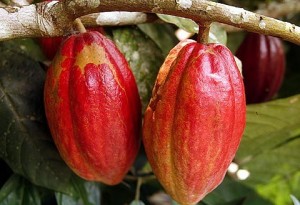Ghana takes giant steps to boost cocoa production
 Ghana’s effort at increasing its cocoa production has taken a giant step forward with the establishment of 20 Rural Service Centres (RSCs) to aid farmers adopt best farm management practices to raise the per hectare yield.
Ghana’s effort at increasing its cocoa production has taken a giant step forward with the establishment of 20 Rural Service Centres (RSCs) to aid farmers adopt best farm management practices to raise the per hectare yield.
The Centres spread across 14 districts in the cocoa belt – Ashanti, Brong-Ahafo, Western and Central Regions, are an integral part of the Cocoa Rehabilitation and Intensification Programme (CORIP), implemented by Solidaridad together with Cocobod, the International Fertilizer Development Company and other private sector partners.
They serve as one stop shop for comprehensive range of services – training farmers on best agronomic practices, assisting them to rehabilitate their farms, renew farms through complete seedlings replanting or canopy substitution through grafting of aged trees.
Added to these is the retaining of inputs – fertilizers, herbicides, tools and irrigation system.
Mr. Eric Agyare, Programme Manager of CORIP Ghana, said the goal was to substantially raise the average per hectare yield from the present 450 kilogrammes to boost farmers’ returns.
He made reference to Indonesia, Brazil and neighbouring La Cote d’ Ivoire where farmers were getting per hectare yield of between 1,200 and 2,000 kilogrammes and indicated that the same could be done here.
He was said this when he conducted journalists to inspect demonstration farms established under the programme and one of the RSCs in New Edubiase, in the Adansi South District.
Mr. Agyare said so far 19 demonstration farms had been established and about 30,000 farmers trained to adopt improved farming practices.
He spoke of the need to ensure a more productive and sustainable cocoa sector – free from poverty and human rights issues, if the nation was to continue to supply more cocoa beans and to remain competitive in the global market.
“Certification schemes alone are no longer enough. Stakeholders in the cocoa sector in Ghana agree a market transformation approach – working with farmers, cocoa and chocolate companies, service providers, consumers and the government simultaneously is the way to go”, he added.
Source: GNA
